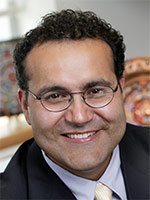Dr. "Q" to Share His Journey at the NAFSA Annual Conference

Plenary Address
Wednesday, May 29
4:00 p.m.-5:30 p.m.
St. Louis, MO
Growing up in a small Mexican village outside of Mexicali, a border city 130 miles southwest of San Diego, Dr. Alfredo Quinones-Hinojosa was a dreamer. As a boy, gazing at the stars in the desert sky from the roof of his family's cinder-block and mud house, he imagined becoming an astronaut. Instead he became a top U.S. brain surgeon, though not before jumping a barbed-wire fence between Mexico and the United States to work in the fertile farm fields, industrial ports and rail yards of California's San Joaquin Valley.
Dr. "Q" will share his journey from farmhand to surgeon as a plenary speaker at NAFSA's 2013 Annual Conference & Expo in St. Louis. He tells his remarkable life story of coming to America from Mexico in his autobiography Becoming Dr. Q, a testament to the power of hope and the relentless pursuit of education. His story is a living example of why the United States needs immigration reform now that meets the needs of higher education and provides a path to legal residency and citizenship for 11 million aspiring Americans living in shadows of our economy.
After years of manual labor and hardship in the fields, ports, and rail yards of California, Quinones-Hinojosa won legal status under a 1986 immigration reform law signed by President Ronald Reagan. He made his way through community college and eventually medical school, though not without suffering racial discrimination and a brush with death.
Quinones-Hinojosa was almost killed in the kind of industrial workplace accident migrant workers nationwide risk daily. Working in a rail yard in Stockton, CA, Quinones-Hinojosa and another worker were removing heavy metal lids from tops of tank cars used to transport liquefied petroleum. By mistake, he dropped a bolt into the tank car and decided to go down and retrieve it. Reaching the bottom of the tank he realized there was no oxygen, only nauseating fumes. Attempting to climb out, he blacked out and fell to the bottom again. Fellow workers braved the toxic gases in the tank to tie a rope around his limp body and haul him out by hand.
Miraculously, Quinones-Hinojosa survived and pushed himself harder to get an education—first at San Joaquin Delta College, then the University of California, Berkeley, and Harvard Medical School. After gaining citizenship in 1997, Quinones-Hinojosa completed his residency at University of California, San Francisco, where he earned a postdoctoral fellowship in developmental and stem cell biology. Today, he is a top brain surgeon and researcher at Johns Hopkins University in Baltimore, MD, where he does up to 300 surgeries a year and is pursuing a cure for brain cancer, which afflicts 35,000 Americans each year.
Quinones-Hinojosa's rise from immigrant to leading researcher is typical of what is happening in U.S. scientific research today. A recent study by the National Foundation for American Policy found that 40 percent of researchers at the United States' top cancer institutes are immigrants. Many are enduring long wait times for green cards.
Asked in an interview on C-SPAN why he devotes himself to research, Quinones-Hinojosa said: "I want to be part of history. I want to help people. I want to continue to live the American dream. I am thankful for the things that this country has given me."
What America gave a younger Quinones-Hinojosa was a chance to earn a living and access to higher education. His story is an example of the human potential that can be unleashed by immigration reform legislation now pending before Congress. It is why Congress should follow the lead of Texas and Maryland to pass the DREAM Act and allow immigrants to have cost-effective access to college. And it's why the United States should provide more green cards for graduates, not just in the STEM fields, but also in the arts and humanities.
As Quinones-Hinojosa says in his book, he hopes telling his story will "encourage any of us who allow ourselves to judge others by their ethnicity or socioeconomic background to open our eyes to all that we have in common."
For more on NAFSA’s immigration priorities go to: http://www.nafsa.org/113thcongress
